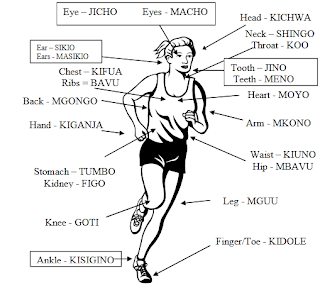CACHA hands out a mini pamplet of useful words and phrases for medical and logistics staff. Here's a sample of the translated terms/words:
Medical terms
What’s your problem? Una tatizo gani?
Do you have a temperature/fever? Una homa?
Do you have diarrhoea? Unaendesha? Unaharisha?
Do you have dysentery? Unahara damu?
Do you feel nauseous? Unataka kutapika?
A blister lengelenge
A headache maumivi ya kichwa
A sore throat maumivu ya koo
Joint pain Maumivu ya kiungo
Flu Mafua
Wound Kidonda
A cough Kikohozi
Heart problem Matatizo ya moyo
Dizziness Kizungu zungu
Constipation Shida kujisaidia
Numbness Kufaganzi
Skin problem Ugonjwa wa ngozi
Ulcers Vidonda vya tumbo
Hiccup Kwi Kwi
Gynecological pains Maumivu ya sehem za siri
Pus / Discharge Ninatoka/Unatoka uchafu
Does your body itch? Unawashwa
My _(insert body part)_ hurts. Ninaumwa _______
My _(insert body part)_ hurts. Ninaumwa _______
Ex. My back hurts Ninaumwa mgongo
Where does it hurt? Unaumwa wapi?
Where does it hurt? Unaumwa wapi?
I have pain here. Naumwa hapa.
S/he has been cut on the ______. Amekatwa ____ni.
e.g. hand etc. mkoni
I’m allergic to: penicillin. Nina mzio wa: penisilini
Are you pregnant? Una mimba? /Wewe ni jamzito?
Would you like to take a HIV test? Utapenda kupima VVU?
Useful words for logistics
Come (here) Njoo (hapa)
Go there Nenda kule / Nenda Pale
Join the line Unga mstari
Sit Kaa
Move over Sogeni
Move back Sogea nyuma
Wait (a little) Subiri (kidogo)
Go to that building Nenda kwenye jengo lile
Please sit down Karibu ukae
Relax your arm Tulia mkono wako
I will take your blood pressure Nitakupima pressa yako
Have you seen the doctor? Umemwona daktari?
Medication Dawa
Pharmacy Duka la dawa
Dentist Daktari wa meno
Doctor Daktari / Tabibu
Greetings + Useful Words
Greeting of respect. Shikamoo
Response to Shikamoo. Marahaba
Hello Jambo
Hello, how are things? Hujambo
Response to hujambo. Sijambo
How are you? Habari yako?
Good. (Response to habari…) Nzuri / safi / njema
At peace Salama
Bye! Kwa heri!
Thank you Asante
Very Sana (Asante Sana)
What is your name. Jina lako nani?
My name is: Jina langu: / Ninaitwa:
I don’t speak Swahili. Sisemi kiswhahili
Please Tafadhali
Yes (It is so) Ndio
No Hapana
How old are you? Una miaka mingapi?
What village are you from? Unatoka kijiji gani?
How much do you weigh? Una uzito gani?
Sorry for your sickness. Pole kwa kuumwa.
I would like… Naomba…
What do you want? Unataka nini?
Where are you from? Unatoka wapi?
Food Chakula
Water Maji
I am from Canada Natoka Canada
I am Canadian Mimi ni mcanada
Do you understand? ** Umeelewa?**
I don’t understand. Sijaelewe
I don’t understand you Sikuelewe
**Not to be confused with:
Are you drunk? Umelewa



